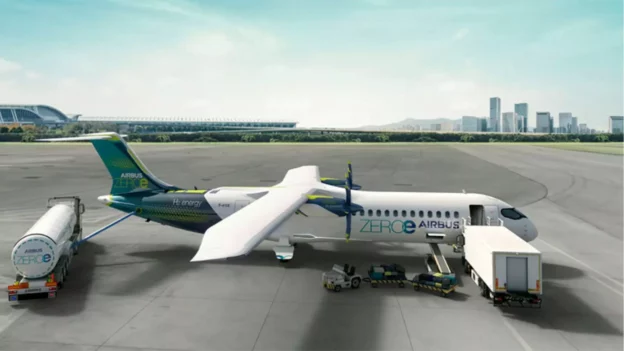The innovative GOLIAT (Ground Operations of Liquid hydrogen AircrafT) project, which is focused on the handling and refueling of liquid hydrogen for aviation, is already underway. Led by Airbus, it involves academic partners, airport operators and companies from the hydrogen industry. Its main objective is to carry out ground operations demonstrations with liquid hydrogen aircraft at several European airports.
Liquid hydrogen for aviation: a viable solution
Those responsible for the project stress the urgency of decarbonizing and strengthening both the economy and Europe’s energy independence. These goals drive the use of hydrogen for mobility and stationary applications, positioning it as a viable solution to decarbonize aviation. decarbonizing short- and medium-haul short- and medium-haul aviation, essential for low-emission air operations.
In terms of funding, the GOLIAT Project receives 10.8 million euros from the EU’s Horizon Europe program and will be developed over four years. The main objective is to demonstrate how liquid hydrogen handling and refueling technologies can be liquid hydrogen and refueling technologies can be developed and used safely and reliably in airport operations.
The GOLIAT consortium also includes 10 partners from eight countries: Airbus (France, Germany, United Kingdom), Chart Industries (Czech Republic, Italy), TU Delft (Netherlands), Leibniz University Hannover (Germany), Royal Schiphol Group (Netherlands), Rotterdam-The Hague Airport (Netherlands), Vinci Airports (France, Portugal), Stuttgart Airport (Germany), H2FLY (Germany) and Budapest Airport (Hungary).
Future of aviation fuel
The consortium supports the adoption of liquid hydrogen as a fuel in aviation through the development and demonstration of advanced LH2 refueling technologies for future large commercial aircraft, demonstrations of small-scale LH2 aircraft ground operations at airports, the development of a Standardization and certification framework for future LH2 operations and the evaluation of hydrogen value chains at airports.
LH2 is presented as a clean and efficient fuel, offering a promising solution to reduce greenhouse gas emissions and dependence on fossil fuels in airport operations. However, there are still challenges to widespread implementation, including understanding the operational, regulatory, economic and security impacts, as well as the capacity and performance of the technologies.
H2FLY: Pioneers in hydrogen for aviation
Josef Kallo, co-founder and CEO of H2FLY, highlights his company’s experience in the HEAVEN project, where they completed the world’s first piloted flight of an electric aircraft powered by liquid hydrogen. They hope to contribute their experience in LH2 operations to GOLIAT, seeing great potential in hydrogen to transform aviation and committing to its adoption for a sustainable future.
Finally, Nicolas Notebaert, General Director of VINCI Concessions and president of VINCI Airports, expresses his commitment to the decarbonization of air transport and the involvement of VINCI Airports in the development of hydrogen use. In 2027, Lyon-Saint Exupéry airport will host the demonstration of this pilot project with a first hydrogen aircraft, while airports in Portugal are also involved in the technical studies required for future infrastructures.
Follow us on social networks and don’t miss any of our publications!
Inspenet.com YouTube LinkedIn Facebook Instagram X
Source and photo: hydrogen-green

